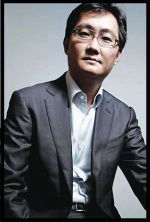Mama Huateng was born into the world in on 29th October, 1971 in Chaoyang, Shantou, Guangdong. He is a Chinese very rich person business head honcho. He is the organizer, director and CEO of Tencent, Asia's most significant organization, one of the biggest Internet and innovation organizations, and one of the greatest speculation, gaming and diversion combinations on the planet. The organization fosters China's greatest portable texting administration, WeChat, and its auxiliaries give media, diversion, installment frameworks, cell phones, web related administrations, esteem added administrations and web based publicizing administrations, both in China and worldwide. In 2007, 2014, and 2018, Time magazine named him one of the world's most persuasive individuals, while in 2015, Forbes acknowledged him as one of the world's most influential individuals. In 2017, Fortune positioned him as among the top financial specialists of the year. In 2018, he was named one of the "Most Powerful People In The World" by the CEOWORLD magazine. Mama was a representative to the Shenzhen Municipal People's Congress and an agent in the twelfth National People's Congress. Being one of "Fortune world's most prominent pioneers", Ma is referred to for his position of safety character when contrasted with individual Chinese finance manager and Alibaba originator Jack Ma's cordial character. Mama has been contrasted with American financial backer Warren Buffett for their comparable speculation draws near, and frequently depicted as an "forceful acquisitor".
Mama Huateng's dad, Ma Chenshu found a new line of work as a port administrator in Shenzhen, the youthful Ma went with him. He was taken on Shenzhen University in 1989, and graduated in 1993 with a four year college education in software engineering. Mama utilizes the epithet Pony, gotten from the English interpretation of his family name Ma (马), which signifies "horse." Ma Huateng only occasionally shows up in the media and is known for his cryptic way of life. He has faith in the adage: "Thoughts are not significant in China – execution is." Ma Huateng's abundance comes from the 9.7 percent stake in Tencent Holdings. He apparently claims property in Hong Kong and craftsmanship pieces worth US$150 million. He claims a redeveloped palatial home of 1,820 m2 (19,600 sq ft) in Hong Kong.
Mama's first occupation was with China Motion Telecom Development, a provider of media communications administrations and items, where he was accountable for creating programming for pagers. He purportedly acquired $176 each month. He additionally worked for Shenzhen Runxun Communications Co. Ltd. in the innovative work division for Internet calling administrations. Alongside four different cohorts, Ma Huateng went on to help establish Tencent in 1998. The organization's first item came after Ma took part in a show for ICQ, the world's first Internet texting administration, established in 1996 by an Israeli organization. Enlivened by the thought, Ma and his group dispatched in February 1999 a comparable programming, with a Chinese interface and a marginally extraordinary name – OICQ (or, Open ICQ). The item immediately got famous and collected in excess of 1,000,000 enlisted clients before the finish of 1999, making it one of the biggest such administrations in China. Discussing the establishing of Tencent, he revealed to China Daily in a 2009 meeting that "In the event that I have seen further, it is by remaining on the shoulders of monsters," rewording a statement ascribed to Isaac Newton and referring to the likenesses among ICQ and OICQ. "We realized our item had a future, however around then we just couldn't manage the cost of it," Ma recollected. To take care of the issue, Ma requested bank credits and surprisingly discussed selling the organization. Since Tencent's valued assistance OICQ was offered for nothing, the organization hoped to financial speculators to back its developing functional expenses. In 2000, Ma went to US speculation firm IDC and Hong Kong's telecom transporter Pacific Century CyberWorks (PCCW) who purchased 40% of Tencent's offers for US$2.2 million. With the pager market declining, Ma further developed the informing stage by permitting QQ clients to send messages to portable handsets. Thereafter, 80% of the organization's income came from bargains hit with telecom administrators who consented to share message expenses.
